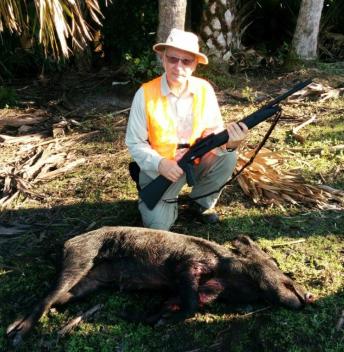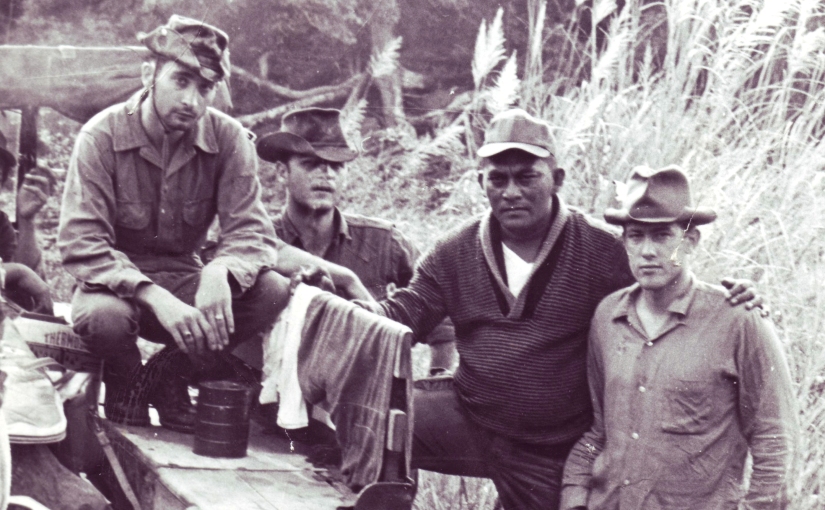WAR
In 1966, hanging out with strange people in Southeast Asia was normal for young Americans. That’s me in the truck, wearing the Aussie hat. I later commemorated this occasion by having a custom patch sewn onto the hat that read, appropriately, “Operation Eagle Sandwich.” The Americans wearing wide-brimmed western hats, we’ll call Dennis and Dave, and the serious man in the middle under a baseball cap can be Rudy. We were on a wild boar hunt. Oh, and somebody did shoot an eagle. I had breast meat, roasted over a bed of salt, with mayonnaise on white bread.
COLLEGE

“What?!”
The Dean of the College of Arts and Science at Ohio State University was startled to see me appear in his office bathroom mirror while he shaved. I shoved my transcript between the mirror and his face. “You told me I would flunk out the first quarter because I worked full time and went to school full time. I want to show you that I got all As.”
Not so hard, really. The university graded on a curve and I was an adult among kids fresh out of high school who were there because it was expected of them. I was there because I worked full time as a janitor to pay for the privilege.
The anti-war demonstrators welcomed me. One April morning in 1970, they had me pushing another vet in a wheelchair at the head of a line of unruly students. We crossed the wide green lawn of the Oval to where a wall of National Guard troops blocked the Administration Building. A guard tapped me on the shoulder from behind. I looked at his M-14 assault rifle and his gas-mask-covered face. “Excuse me, sir,” he said politely. “We’re getting ready to tear-gas the crowd and you might want to leave.” You learn more at a university than what is on the curriculum.
https://www.thelantern.com/2010/05/1970-protests-erupted-across-ohio-tear-gas-at-osu/
FAMILY

Somewhere between my first and third marriages, I married a second time and we had kids worth dying for. One day, a young couple was found dead only three houses away from where we lived. They had been tied up with coat hangers in their bathtub and beaten to death with a bowling ball. I lay in bed that November night in 1973, thinking about how best to protect my family and concluded that we had to get away from civilization.
About 4:AM, I woke my wife and gave her a cup of black coffee and two No-Doz pills before announcing, “We’re going to Alaska to live.” I resigned my job as a fabric store manager and we sent my brother a letter telling him, “Dear Ray, we’re going to Alaska to live. Here’s the key to our apartment, take what you want. Don’t tell Mom until we get there and call her.”
Wife and I and 18 month old son went to JC Penney’s that morning. I had a paperback titled, How to Build a Log Cabin In the Wilderness. We piled the counter with sleeping bags, ropes, a tent, lights and batteries, a couple of mess kits, axes with extra handles, and then I spotted a poster on the wall behind the counter. “JC Penney’s, Stores Coast to Coast, Including Alaska and Hawaii.” All of a sudden, my mental picture of Alaska changed to include streets, buildings, apartments! We took cash instead of goods. We were excited and enjoyed the next week, driving from Columbus, Ohio, to Vancouver, B.C. & up the Alcan Highway.
I went to work selling for Xerox Corporation and made more money than I expected because of the trans-Alaska pipeline boom. We had a daughter and bought a home in the suburbs of Fairbanks. It’s a great place to raise kids.
WRITING

Relax. It's food. The boar was donated and a Catholic charity used the meat to help feed the homeless.
There was no fourth marriage. The lady who’s lived with me for 26 years now thinks I’m not a good marriage risk. I love her, of course. Relationships are life’s musical chairs. At some point, you sit.
We met on the Internet in the early days of the world-wide-web. In 1994, Sierra’s INN, or, ImagiNatioN Network, connected people to their game site by long distant phone lines. We ran up phone bills of over $500 a month each. It made sense to move in together.
One of those things I told the lady early on to impress her was that I had published a book. True. But. An instruction book. OKAY, booklet. The Futhark Rune Oracle. At the time, I lived in Wiccan country, Manitou Springs, Colorado, at the foot of Pikes Peak on ground once held sacred by Ute Indians and recently reconsecrated by the local coven. A Wiccan Princess (her name may not be spoken) wanted instructions to go with the Nordic runes she sold to the Japanese. I spent a summer researching rune mythology. The book is authentic. And copyrighted. Still, I felt guilty. So, I wrote a novel dedicated to my lady. Penguin published it.
The Phoenix Diary is a young adult book because I expected my young grandchildren might read it. It is science fiction because, when I was their age, I assumed that by the time I was my age I would know the answers to life’s big questions. Not one to be thwarted by ignorance, I now make up the answers to life’s big questions in science fiction stories.
So there you have it. The first photo shows me on a wild boar hunt in 1966. The last photo shows me on a wild boar hunt a half century later. In between, it’s been full, strong lives. Even if I still don’t know what it all means.

It was a confrontational time to grow up, wasn’t it? I remember hearing about the war in Vietnam every day on the news from my elementary school years till beyond my college days. Powerfully formative.
LikeLiked by 2 people
That it was. I recall a two-page center spread in the OSU newspaper showing a scene photographed from above. On one page were police & national guardsmen, on the other page were protesters. Down the center fold , between the opposing sides, stretched a coil of barbed wire. “That,” I thought to myself, “Is confrontation. No room for compromise there.”
LikeLiked by 2 people
So much has changed. So much remains the same.
LikeLiked by 2 people
Yes!
Exactly the conclusion I come to when I watch life.
I once researched the Sumerians for a scene and was struck by how similar people are. Across time and cultures, basic human nature doesn’t change. Anyone outraged by the current political climate should read the Lincoln-Douglas debates, or some of our founding fathers’ statements as candidates. The great causes have always been with us.
LikeLiked by 3 people
It makes me wonder why some of us lean toward autocracy, and others toward altruistic sacrifice. How much of our inclination is genetic?
LikeLiked by 3 people
Oddly enough (or, GMTA) I’ve wondered about that. It’s almost as if there are two distinct groups amongst us. Each sees the world as it is. One wants to change things for the better and the other wants to make the most of the way it is.
As for genetic disposition, I don’t know. When 23andme checked my Lady’s DNA, they accurately predicted her eye & hair color, that she was not a deep sleeper, consumed caffeine, and had a fear of heights. But everything was based on a physical characteristic. For example, fear of heights is genetically based on eyesight because we use visual input for balance. I can’t guess a physical basis for autocratic governance or altruism.
I like the other question you suggest, “Is the tendency toward autocracy or altruistic sacrifice evolutionary?” I think the answer here is, yes. Human survival can obviously require both, depending on the circumstances.
Sigh. Maybe Pangloss was correct: This is the best of all possible worlds.
LikeLiked by 3 people
Certainly history illustrates the rise and fall of autocrats, but it seems their falls are inevitable, even if the only reason is that we are mortal. Even long traditions of autocracy eventually fail. The prevailing sense seems to be that humanity moves — slowly but irresistibly — toward mutually respectful, cooperative civilization.
Pangloss may be right at the moment, but I think the best of all possible worlds will see autocratic tendencies fade to extinction as self-destructive traits.
LikeLiked by 3 people
I hope your’e right, of course. But maybe autocrats have evolved because they contributed to the species’ survival. A ruler who has absolute power may be exactly what is needed in some circumstances. Take Saddam Hussein, for example. I see what happened when the son ignored the father’s advice and invaded Iraq. Bush senior, former head of the CIA, did not invade after freeing Kuwait because, he said, without Saddam, the country will fall into civil war. Saddam prevented war among the religious factions precisely because he was a ruthless autocrat. Given their freedom, the factions did (& do) war on one another. In a way, we killed more Iraqis than did Saddam.
All this is to say that I am an optimist, albeit one with a sense of why hope is so necessary 🙂
LikeLiked by 3 people
A rich conversation going on here that gets my neurons fired up a bit. I remember taking a course in college in the early 70’s–sociobiology. It extrapolated some of the “hard science” of biology, including genetics, to explain some of the “softer” social science observations and theories contained in sociology. I also recall a documentary about animal behavior, including human behavior, that argued cooperation is a more successful survival strategy over competition.
A lot has changed in our understanding of biology. This is particularly true of genetics and especially epigenetics. Neurobiology and how it affects behavior has also advanced far beyond the time I studied it (my major was Neurobiology and Behavior). My thinking has evolved as well to better see a bigger picture emerge to account for individual and collective behavior. Biological, sociological, and cultural influences all provide inputs. These and other inputs have constraints and capacities that limit potential outcomes. Sometime in the future we might be organized as a federation of planets and species. We may be genetically and/or technologically enhanced to allow for expanded capacities. Or we could devolve to isolated tribes ruled by autocrats in a post-apocalyptic dystopia.
At the level of consciousness, we are evolving individually and collectively as a species. I think our evolution will continue. Homo spiritus, Homo sapien 2.0, Homo illuminatus are some of the terms I have come across to label this next more evolved human.
LikeLiked by 3 people
I love this discussion. I even think there is a point to it all. But first, some thoughts.
Humans do advance. In all ways possible. We co-operate to build larger groups, cities, nations, unions of nations. We also develop weapons and armies capable of destroying whatever we build. Sometimes, we take a hit.
Advancement is not a straight line. It’s more of a stock-market wobble.
As a thought experiment, consider starting a Facebook group of outlaws. Invite the scum of the earth, professional criminals, con artists, rapacious businessmen and corrupt politicians. What would we learn from personally knowing these people? As writers, we write about them. Consider it research.
Bad people, good people who make mistakes and natural disasters have greater impact than good intentions. They probably have also benefited humanity at times. The Vikings had a rune, Thor, that represented the ravages of spring storms and floods as necessary to clear the way for new growth.
I’m beginning to think that not only is everything possible, everything is necessary.
The Point:
We have to start thinking outside our heads. Understandings built in our mind often crumble in the real world. Maybe the three of us, playing devil’s advocate while offering up our best understanding, could distill what we know into a unified theory of humanity? Something that tells us what people are like. Something that makes sense knowing what we know of history and of current events.
Something that shows us what we will be like in the future.
Let’s play devil’s advocates as friends. We can put forth our ideas (including what Faulkner called out little darlings) and get rid of those that don’t hold up in reality. What’s left should be the uncomfortable truth about humanity. Something we can build on.
LikeLiked by 3 people
I’m in, and I’d like to advocate for the devil from a storyteller’s point of view, which is probably closer to a sociologist’s than a neurobiologist’s or geneticist’s.
If we begin at the beginning of human social groups — way back in Neanderthal days or earlier — I will posit that bonding began with mating, and expanded to family. Who would lead? Until nuanced language developed, probably the strongest male — and probably with complete authority — an autocrat who ruled by brute force and fear. He would fight challengers from within his family group, solitary males (perhaps outcasts from other groups), and eventually, a younger male would challenge the leader and win. If the old leader survived, he would certainly lose his position of authority to the winner. The group would stay together to enhance their chances of survival. In simple terms, evolution would favor big muscular people with aggressive behavior and those who are pre-disposed to following and not questioning the status quo.
I suspect autocracy was humanity’s original governing style. It would have been necessary in a harsh environment where saber-toothed cats are higher on the food chain than homo sapiens. That makes sense to me. Of course, I invite you to show me where my thinking is mistaken.
But before you do, let me move further up the evolutionary ladder.
As language and intellect develop, communication becomes more nuanced, and cooperative planning becomes more complex and forward-thinking. Perhaps a few younger, smaller members of the group (beneficiaries of the evolving intelligence genes) believe the head brute is making undesirable decisions — or maybe they’re just fed up with being bullied — so they band together to usurp the old guy’s throne. Maybe they kill him. Maybe they let him live and remain with the group as a contributing member. Maybe they exile him and he preys on a different group led by a guy vulnerable to overthrow. Or maybe he becomes cat food. Whatever.
Now the young usurpers have to figure out who the new leader will be. One option might be that the most brutish among them knocks off the others one by one until those who remain see the wisdom of submission. They might become valued lieutenants or advisers. Another option might be to share leadership according to their individual talents, or maybe just with the intention of not allowing anyone else to rule. Either way, they keep passing down those evolving genes that favor intelligence, communication, and civilization. And somewhere along the way, somebody comes up with a plan to bypass the big cats on the way to the top of the food chain.
Group decisions necessitate communication and tolerance. The individuals have to view other individuals as having worth equal to their own. Those choices don’t eliminate autocracy, but they resist it and look beyond the greed/desire/self-centeredness of the autocrat, toward a future that aims to improve life equally for the entire group — except for the women, of course. Their job is growing food and babies.
And the beat goes on.
LikeLiked by 3 people
My thoughts want to go in several directions of inquiry and discussion. As we look back through the lens of anthropology, there has been an evolution of human social structure, for example: hunter/gatherer>>agrarian>>industrial. All the social structures have had some division or differentiation of labor, tasks, etc. I suppose the unsuccessful strategies to assign and delineate tasks required for survival were gradually eliminated. Does someone need to be in charge? Can an egalitarian society based upon equality work? I think the answer is in the affirmative, but historically has not worked as well as more autocratic strategies.
I am a big fan of applying Integral Theory to understand past and present. I think of Integral as the perspective of multiple perspectives and the intra/inter relationships among the various perspectives. Ken Wilber’s books such as “A Theory of Everything” and “A Brief History of Everything” give a framework for understanding the world and reality through a multifaceted lens. It accounts for forest and trees, whole and parts, thesis, antithesis and synthesis.
I find it useful to think of much of what we are beginning to discuss by applying some tools of Integral analysis. The first is a “Four Quadrant Analysis”. This separates the individual and collective perspectives in a horizontal axis and the subjective/objective along a vertical axis. This gives 4 different analytic perspectives: individual subjective, collective subjective, individual objective, collective objective. By way of example, my personal beliefs are in the first quadrant, cultural values in the second, the home I occupy in the third, and the world we occupy in the fourth. I/me internal = 1, We/us internal = 2, It/its external to me = 3, It/its external to us = 4.
Where am I going with this digression? Depending on what quadrant you are looking out from determines what you see. The other perspectives might be at odds with what you see. A Jungian psychiatrist sees a patient’s behavior primarily from this first highly internal perspective. A behaviorist trained to look at things from a B.F. Skinner approach sees their patient through the second perspective where external stimuli and events are deterministic. Anthropology is in the third quadrant while sociology is in the fourth.
I can cogently make arguments that account for human behavior from any of these perspectives even though some might be in opposition to each other. Each perspective is a lens or filter that provides a useful but limited view. If you are a strict materialist, you believe we are meat sacks and our consciousness derives from neural activity. If you are a spiritualist, you believe we are spiritual beings having a physical experience. Ultimately, they are belief systems. Our conditioned minds are shaped in part by these beliefs. Then we become constrained by our own conditioning. Can you imagine a world, a culture, a society, an individual brought up and conditioned by radically different beliefs? Their understanding of reality would be different than how we view reality. Robert Heinlein’s “Stranger in a Strange Land” comes to mind. Can we grok that?
I can go on and on, but at the end of the day I’m not sure I understand much about anything. I have grown more comfortable with this ambiguity. I think my head and the analytic left brain need to step aside and allow me to just be present to what is. No thinking. Simply being.
LikeLiked by 2 people
I feel a rant coming on. I shall cogitate, ruminate, and elucidate later this evening.
LikeLiked by 2 people
“People’s all there really is,” Angel liked to say.
– The Phoenix Diary
For the first time in human history, most of us can know the whole world. We can actually see how people live in England or Egypt. We can listen to the music of India and America. The newspapers in Israel, Russia and Japan show us what is important to the people there. And, people everywhere seem to be basically the same. We know for a certainty that, “me and you and they,” behave pretty much alike. Basic human behavior can now be examined apart from religious, political or cultural differences. For the first time in history, anyone can understand human behavior based on worldwide observation.
“Lay down your prized views now, they’re no damn good.”
– The Eagles, Doolin-Dalton
(OKAY, I paraphrased that. But, If you only want to know what is already believed, become a teacher.)
We do have, and have always had, autocrats who rule by brute force and fear. Autocratic rule is as natural as cooperative planning. By natural, I mean “adjective 1. existing in or caused by nature; not made or caused by humankind.” In some situations, we are best served by diplomats while others require disciplined soldiers. Humans adapt to their circumstances. I don’t see that changing.
The Internet makes it relatively easy to develop an understanding of humans based on observation. We evolved, physically, to fit our environment. One only has to Google Darwin’s observations of life forms adapting differently to their isolated environments to know that.
We know our own behavior changes to fit the circumstances. Available history makes it clear that basic human behavior is the same now as it was in Sumeria four thousand years ago.
Consider Enheduanna. That’s, En (chief priestess) hedu (ornament) anna (of the Sky God, An.)
Enheduanna was tasked by Sargon the Great to aid him in the unification of the various peoples he had conquered. He wanted everyone to believe in the same religion. She contributed by writing hymns to be sung in seven temples throughout Sumeria. She was a writer, a poet and a propagandist. Maybe, the first of all three. She died in 2250 BC at the age of 35.
I say, if we just observe, we’ll figure us out 🙂
LikeLiked by 3 people